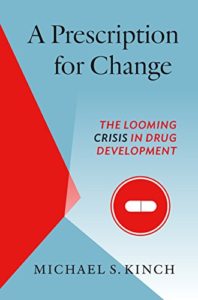 In this newly released book, Michael Kinch begins with the history of drug development from ancient times up to 2016. He’s qualified. Kinch is a knowledgeable insider in drug development, biotech, and in university research, with experience in both the scientific and the business sides of all these institutions.
In this newly released book, Michael Kinch begins with the history of drug development from ancient times up to 2016. He’s qualified. Kinch is a knowledgeable insider in drug development, biotech, and in university research, with experience in both the scientific and the business sides of all these institutions.
Major themes are fast mutation and drug resistance, and the inability of health institutions in the present environment to attain the process speed to keep up. (By Compression Thinking, we’d call this “learning speed.”) The institutions are in a race against increasing complexity.
Kinch packs in detail, but keeps it readable. On the way through, outsiders can pick off interesting insights. One of those is Eroom’s Law. An example of that law is why a cocktail of drugs is needed to keep HIV/AIDS in check: HIV viruses mutate so quickly that they soon resist one simple drug. Mutation has to be corralled in mixtures of them, leaving nowhere to run. However, seven out of the ten companies in AIDS research have discontinued it while the viruses seeking free range keep getting smarter.
Patient education and discipline must not be neglected. AIDS patients feeling good may go on vacation. Unfortunately, they may also take a drug holiday. To viruses, that’s like opening the corral, letting the mutants run off in a new wild direction.
Our bodily lives are long adaptive dances with our parasitical microbes and viruses. We are largely oblivious to both the motion and music. Kinch wants humans to realize our lowly status in nature: We think we are the top of the food chain. We’re not. Viruses eat us. Unchecked, either by our own system, or by artificial assistance, they may finish their meal. To keep them corralled, our systems have to adapt as fast as the viruses. If our system can’t keep up, perhaps we can artificially boost it.
Antibiotic overuse and resistance are well-known. Kinch questions whether enough work is going into alternatives for microbial control. If “market incentives” are not tuned to pay attention, we will revert to pre-antibiotic susceptibility to microbial contagions.
Likewise, the public poorly understands the annual race formulating flu vaccines. Flu viruses mutate and spread so quickly that a vaccine mix may lose effectiveness within a few months. Global travel complicates prediction and control. Mutational “shifts and drifts” migrate overnight, and some hide in carriers that are immune, but that stand ready to infect humans and animals upon arrival.
We have forgotten how devastating an ugly mutant flu virus can be. Kinch points out that the basic reason for the end of World War I was that soldiers on all sides became so sick with the “Spanish Flu” that they could no longer fight. And we are fighting our own psychology, deluded that something not seen for a while is gone forever.
The mentality of pharmaceutical companies and much of the health establishment has not caught up with the whirl of complexity. They still want blockbuster molecules that assure profit over the life of a patent. Actually needed are high-speed investigations and responses. The package to sell is fast clinical trials for each patient, not the outcome of one clinical trial for all patients indefinitely.
On many fronts, we appear to be heading toward individualized medicine. No two people, their immunities, and their allergies are alike.
Cancer is an example. It comes in many forms, and although it has common themes, it manifests uniquely in every individual, like snowflakes, each one different in detail, but with a common pattern. Therefore, the treatment of cancer has to be tailored to each individual. In cancer treatment, oncologists need a big compendium of drugs and latitude using them. (And yes, couldn’t we avoid the most devastating chemotherapy?)
As Kinch makes his case, he describes the current state of pharma and biotech companies as autophagy, a condition in which stressed cells start eating part of themselves to keep the rest of them alive. His mission is to build up a much stronger, faster system of biotech development.
However, the vision is a little foggy at the end. Does Kinch want to restore the system to a better version of what it was, or does he want to transform it into something that at present is hard to visualize? Or perhaps transform the system in ways promoted elsewhere: less medicine, but much more effective medicine yielding better health.
